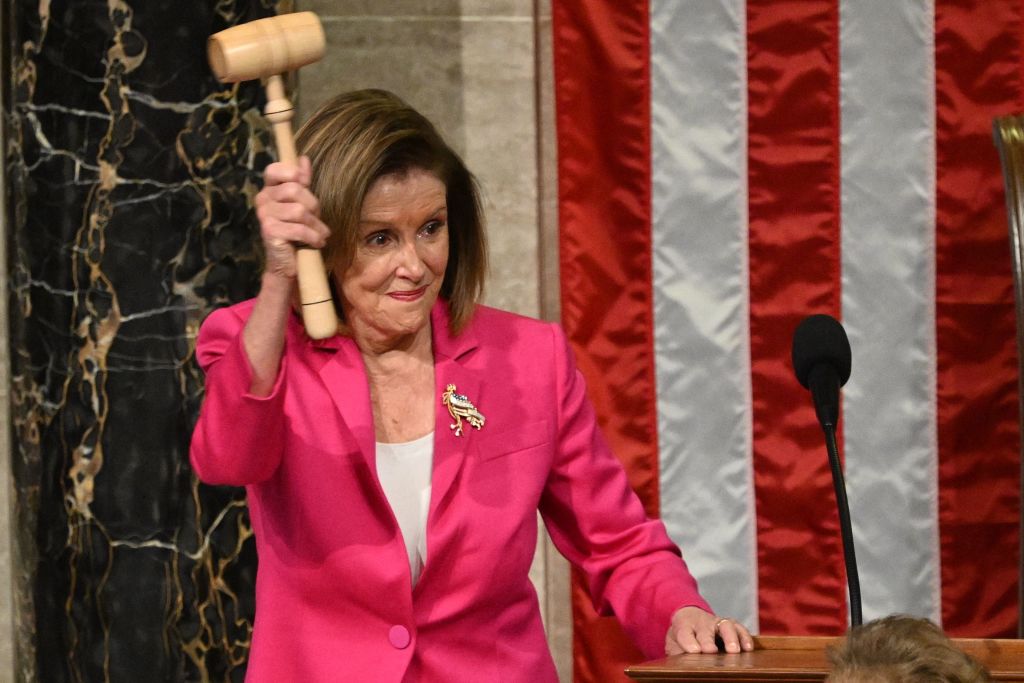It’s not exactly a blistering insight into how Washington works, but nothing will get you more praise and respect than being powerful and wielding that power effectively. So, it should be no surprise that Nancy Pelosi finished her tenure as speaker of the House to lavish applause. Many dubbed her the greatest or most effective speaker in modern history—or even ever.
The contrast with Rep. Kevin McCarthy’s ongoing effort to get elected speaker couldn’t be starker. Firebrands and rabble-rousers in the GOP conference want to weaken McCarthy and the office of speaker.
I hold no brief for McCarthy the man, but the way much of Washington talks, it’s simply taken for granted that weakening the speakership would be bad. The truth is that a weak speaker might be the best thing for a strong Congress.
Put another way, the Pelosi model of governance is part of the problem. Yes, she was very effective, but her effectiveness came from a centralized, top-down approach—which has its historical roots in, among other things, Newt Gingrich’s “Contract with America” reforms in the early ’90s. This approach is one of the drivers of political dysfunction in Washington and the country.
Congress is supposed to be where politics happens. Representatives from different regions, with different interests, are supposed to hammer out legislative solutions from the ground up. Legislation should come at the end of a process of discovery, in committees empowered to weigh debates between competing experts and constituencies. This process builds consensus. It gives the public an opportunity both to hear competing points of view and to be heard.
The Pelosi model reverses all of this. Legislative priorities—including huge, undebated omnibus spending bills—are worked out almost entirely by the speaker and the Senate majority leader and then presented as a fait accompli to legislators, like unimprovable stone tablets. And because of the hyper-partisanship that Congress’ dysfunction helps fuel, legislators are expected to vote on a straight party line.
Worse, when some policy changes are too radical, unpopular, or flatly unconstitutional to pass even on a party-line basis—such as forgiving billions in student debt—Congress simply asks (or allows) the executive branch to do it unilaterally with no legislative support or legitimacy whatsoever. This makes politics ever uglier and more zero-sum because it turns presidents into elected monarchs and leaves unelected judges as the only check on executive power.
When I came to Washington, it was not unreasonable to think that some committee chairs—like Ways and Means baron Dan Rostenkowski—were more powerful than the speaker. Things were hardly perfect then. But over the last 20 years, we’ve come to accept Congress’ dysfunction as normal and celebrate those who capitalize on it.
It’s fine to decry how members of Congress are too partisan and too performative, preferring to denounce “the establishment” from cable news studios or to write meaningless press releases or tweets rather than actual legislation. I’ve been calling Congress a “parliament of pundits” for years now. But it’s worth asking: Where did the incentive structure for this frivolous gamesmanship come from? The answer: Our legislators—and by extension their constituents—have been locked out of the legislative process. Add in the baleful role of primaries and you can see why virtually every Republican congressional challenger rails that their Democratic opponent voted 100 percent of the time with Nancy Pelosi or why Democrats say their opponents voted in lockstep with Trump. They had no better options.
Congress is an attractive platform for frauds like pathological liar George Santos and human Twitter accounts like Matt Gaetz because it’s an increasingly unattractive choice for serious people.
Former Speaker Tip O’Neill famously said “all politics is local.” That’s no longer true. All politics is national now because Congress no longer plays its role as the arena where political disputes are settled through a robust legislative process. Congress is supposed to soak up political discord and channel it productively. But the intake valves have been welded shut, the better to impose policies from above. As a result, politics seeps into every other nook and cranny of government and life.
A weak speaker won’t solve these problems overnight. But it would be a step in the right direction.







Please note that we at The Dispatch hold ourselves, our work, and our commenters to a higher standard than other places on the internet. We welcome comments that foster genuine debate or discussion—including comments critical of us or our work—but responses that include ad hominem attacks on fellow Dispatch members or are intended to stoke fear and anger may be moderated.
With your membership, you only have the ability to comment on The Morning Dispatch articles. Consider upgrading to join the conversation everywhere.